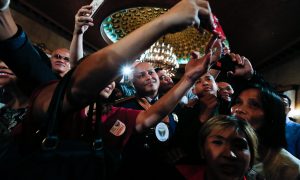With televised disputes, theatrical production cuts, and digestible narratives, there is not much to distinguish American channel TLC’s Reality TV show, 90 Day Fiancé from most others. But a season earlier in 2020—featuring an American man, “Big Ed” travelling to the Philippines to meet with his fiancé, Rosemarie Vega—shows us the dominant narrative around these kinds of international marriages may be changing.
90 Day Fiancé is based on the K-1 visa in the United States, which allows US citizens to bring their foreign partner to the country with the understanding that they must wed within just 90 days. The show’s most dramatic scenes usually feature fights that are generated by the pressures imposed on the couple by this time limit.
Couples on the show can meet for the first time in the home country of the non-US partner, but they must also stay together for just 90 days, despite there being no legal requirement of this outside of the States. The pressure from this deadline pushes the pair into either marrying or breaking up by the end of each season.
Running since 2014, the show has perpetuated ugly stereotypes in the past, often showing snippets of concerned family of the US citizen fretting over the possible disingenuous motivations of the foreign partner to obtain citizenship and leverage their economic situation.
A particular risk for the foreign women featured in the show is that they are presented as scammers or connected to the highly pejorative concept of “mail-order brides”—calculating gold-diggers from impoverished backgrounds going into an agency-arranged marriage with designs on their partner’s wealth and citizenship.
The image of the mail-order bride from the Philippines has a long history in American media. In the 1980s, it was common-place for international matchmaking agencies to compile catalogues of Filipino women which were sent across the US to paying American men in their quest to find a wife. These often included details of a woman’s age, weight, height and a photograph.
In 1986, The New York times referred to these agencies as specialised in “promoting mail-order romance, linking Asian women with men from the United States” and emphasised the escape from poverty as a main motivation for Filipino women in participating in the mail-order business, and because marriage would be the fastest legal way of entering the United States.
The industry—unsurprisingly—revealed itself to be a vicious breeding ground for abuse and exploitation, and in 1990 the mail-order bride industry was officially outlawed in the Philippines, with the government legislating the Republic Act Number 6955 in which any business matching Filipino women with foreign nationals was subject to a high penalty. The United States introduced the International Marriage Broker Regulation Act to further protect women entering the US as spouses from potential domestic abuse.
Despite these legal changes and recognition of the industry’s damage to these women, the image of the Filipino mail-order bride persisted in the imagination of the US. One popular television show in 1994, Frasier presented a joke surrounding an expensive surgery, in which the father teases, “For an extra five grand, you can get a whole new wife from the Philippines.”
The ongoing presentation of Filipino women as impoverished, commodified and intent on marrying American men mostly for their US citizenship, essentialised the experiences of these women and reinforced assumptions of their inherently negative natures and motivations.
This is why it is interesting to look at how Rose and Big Ed have been presented in 90 Day Fiancé.
The love story does come with a brief, stereotypical subplot, with TLC releasing a YouTube video, Is Rose scamming Big Ed? But interestingly, this is not the narrative the producers chose to flesh out the most throughout the rest of the couple’s segment.
Rather, they chose to put the lens primarily on Big Ed—and a discernibly negative one at that.
Scenes ranging from Big Ed asking Rose to take an STI check while not taking one himself, demanding she shave her legs to be more womanly, and even exposing the audience to extended cuts of his styling his hair with mayonnaise, the producers’ intention was clearly in constructing a caricature of Big Ed.
Rose, on the other hand, is presented as a balanced, likeable individual, with reasonable emotional responses to Big Ed’s antics. Importantly, she is shown to be uninterested in Ed’s money or citizenship, clearly outlining this is not her true motivation when she says to him, “You think I want your money not you” and coolly dumps him at the end of the show.
The producers could have chosen to focus on footage of Rose’s sister asking Big Ed for money, or concentrate on the few occasions when Rose reaches into his wallet to help him figure out the correct amount of Pesos to purchase items at a market, if they had wanted to present her within the confines of mail-order bride imagery. But Rose’s voice is clearly heard, her true intentions are given airtime—and these intentions clearly show a lack of either interest or design on Big Ed’s citizenship or wealth.
There are a few reasons from this shift in representation.
Firstly, we can speculate there has been a change in audience taste. TLC had good reason to pursue Mayonnaise Ed: the more the dynamic of the likeable character defending herself against a caricature was presented, the more the views went up. Is Rose scamming Big Ed? reached 4 million views on YouTube over three months—whereas the video, Rose goes off at Big Ed reached 10 million hits in just one month.
But more than this, there is now a cost to producers in presenting women in this damaging way, due to the increase of digital platforms in which dissenting voices can finally be heard en masse.
Prior to the internet, there were already a vast array of Filipino women’s activist groups both within the Philippines and the United States, protesting against the harmful depictions of Filipino women in US media.
...globally there are many places where innovation is happening in television and in other forms of media, and the Philippines is definitely one of those places.
Philippines beyond clichés series 1 #1: Celebrity culture
But due to a lack of Philippine representation (and of people-of-colour in general) within large American media conglomerates, the voices of Filipino women were easily ignored or unheard when it came to their representation.
Fast forward to the internet age, and we’re starting to see cases where meaningful activist work can get the traction it needs in order to make changes in the media.
For example, as recently as 2016 American Channel NBC attempted to run a sitcom entitled “Mail Order Family” which would feature a widower ordering a wife from the Philippines to help him raise his preteen daughters. The show attracted major backlash, principally driven by the work of Gabriela USA, an overseas chapter of Filipino women’s activist group Gabriela National Alliance of Women.
The group started a campaign including a change.org petition calling for the show to be cancelled, which reached 13,340 signatures, and they actively used social media and hashtags to start a conversation about the damaging stereotypes surrounding Filipino women in the United States and the way these stereotypes are normalised in US mainstream media.
Others used websites to construct their own version of Filipino women in response to NBC, including one article entitled Not A Mail Order Bride in which the author traces the experiences of individual Filipino women she knows and re-presents them with her own voice.
Even Rose from 90 Days Fiancé constructs her own version of herself outside of the Reality TV scaffolding, having recently launched a YouTube channel in which she presents her life in the Philippines to her mostly American audience.
Digital media has been a crucial element in challenging the dominant narrative surrounding Filipino women in the United States. If 90 Day Fiancé is anything to go by, maybe the representations are finally getting closer to ‘real’ Filipino women—even for Reality TV.
 Facebook
Facebook  Twitter
Twitter  Soundcloud
Soundcloud  Youtube
Youtube  Rss
Rss 



